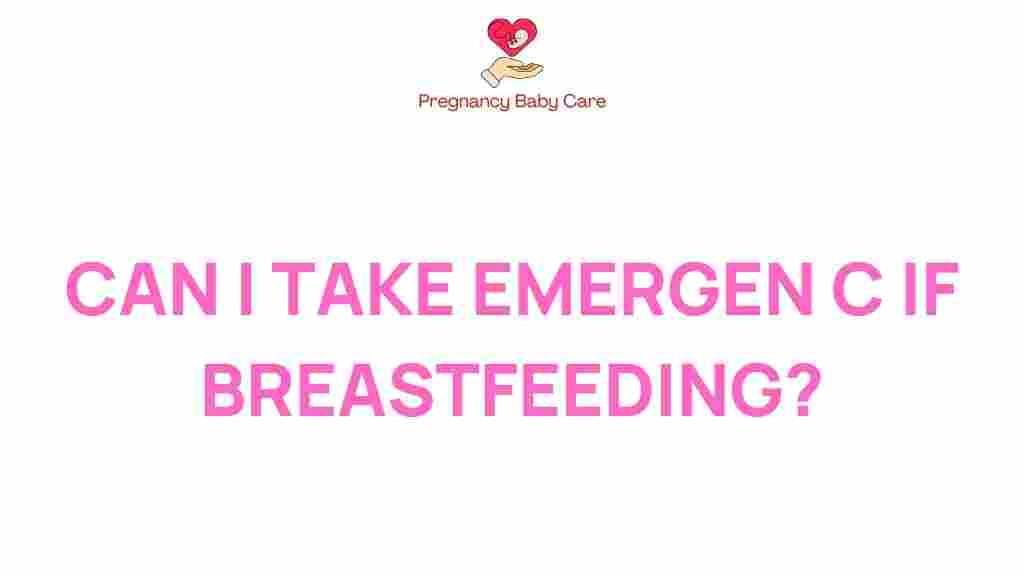The Truth About Emergen-C: Is It Safe While Breastfeeding?
As a new mother, ensuring the health and well-being of your baby is a top priority. With numerous supplements available on the market, it’s natural to have questions about their safety and efficacy during breastfeeding. One supplement that often comes up in discussions is Emergen-C. This article will delve into the safety of Emergen-C while breastfeeding, the role of vitamin C in nutrition, and how it can affect your health and immune support.
What is Emergen-C?
Emergen-C is a popular dietary supplement that provides a high dose of vitamin C along with other vitamins and minerals. It is often marketed as a way to boost immune support, increase energy levels, and enhance overall health. The primary ingredients typically include:
- Vitamin C
- B vitamins (B1, B2, B3, B6, B12)
- Electrolytes
- Other antioxidants
Emergen-C is available in various flavors and forms, including powdered packets that can be mixed with water for a fizzy drink. Many mothers wonder whether these supplements are safe to consume while breastfeeding, considering the importance of nutrition during this period.
Understanding Vitamin C and Its Importance
Vitamin C, also known as ascorbic acid, is an essential nutrient that plays a vital role in numerous bodily functions, including:
- Boosting the immune system
- Promoting healthy skin and tissue repair
- Enhancing iron absorption
- Supporting overall metabolic health
For breastfeeding mothers, maintaining adequate vitamin C levels is crucial, not just for their own health but also for the health of their baby. Vitamin C is excreted in breast milk, contributing to the nutritional needs of infants. However, it’s important to understand how much vitamin C is safe and beneficial during this period.
The Recommended Dietary Allowance (RDA) for Vitamin C
The RDA for vitamin C varies based on age and gender. For breastfeeding mothers, the RDA is:
- 85 mg per day for mothers aged 19-50 years
- 120 mg per day for breastfeeding teenagers aged 14-18 years
Most breastfeeding mothers can meet their vitamin C needs through a balanced diet rich in fruits and vegetables. Foods high in vitamin C include:
- Citrus fruits (oranges, lemons, limes)
- Strawberries
- Kiwi
- Bell peppers
- Broccoli
Is Emergen-C Safe While Breastfeeding?
The safety of any supplement during breastfeeding should be carefully considered. Here are some key points regarding Emergen-C and its safety:
- Vitamin C Content: Each packet of Emergen-C typically contains about 1,000 mg of vitamin C, which is significantly higher than the RDA. While vitamin C is water-soluble (meaning excess amounts are usually excreted), high doses can lead to gastrointestinal upset, including diarrhea and stomach cramps.
- Other Ingredients: Emergen-C contains various B vitamins and electrolytes, which are generally safe. However, excessive intake of some B vitamins can lead to toxicity. For example, high doses of B6 over time can cause nerve damage.
- Consulting Healthcare Providers: It’s always wise for breastfeeding mothers to consult with their healthcare provider before introducing any new supplement, including Emergen-C. They can provide personalized advice based on individual health needs and dietary intake.
Potential Benefits of Emergen-C for Breastfeeding Mothers
Despite the concerns, there could be potential benefits of taking Emergen-C for breastfeeding mothers:
- Immune Support: The high vitamin C content may help enhance the immune system, which can be beneficial during the postpartum period when mothers are susceptible to infections.
- Energy Boost: The B vitamins in Emergen-C may help combat fatigue, a common complaint among new mothers.
- Convenience: For mothers struggling to get enough fruits and vegetables in their diet, Emergen-C can serve as a quick, convenient source of vitamin C.
How to Incorporate Emergen-C Safely
If you decide to take Emergen-C while breastfeeding, here are some steps to do so safely:
- Check with Your Doctor: Always consult your healthcare provider to ensure it’s appropriate for your situation.
- Start with a Lower Dose: If you choose to use Emergen-C, consider starting with half a packet to assess how your body reacts.
- Monitor Your Body’s Response: Pay attention to how you feel after taking Emergen-C. If you experience any adverse effects, discontinue use and consult your doctor.
- Focus on Diet First: Prioritize getting your nutrients from whole foods before relying on supplements.
Troubleshooting Common Concerns
Breastfeeding mothers may have specific concerns when considering supplements like Emergen-C. Here are some common issues and solutions:
1. Gastrointestinal Issues
If you experience gastrointestinal discomfort after taking Emergen-C, reduce the dosage or stop taking it altogether. High doses of vitamin C can lead to:
- Diarrhea
- Stomach cramps
- Nausea
2. Allergic Reactions
While rare, some individuals may experience allergic reactions to ingredients in Emergen-C. Symptoms may include:
- Itching or rash
- Swelling of the face, lips, or tongue
- Difficulty breathing
If you experience any of these symptoms, seek medical attention immediately and discontinue use.
3. Overconsumption of Vitamins
Taking multiple supplements can lead to excessive intake of vitamins, which can be harmful. Always keep track of any additional vitamins you are consuming from other sources.
Conclusion
In summary, Emergen-C can be a convenient way to boost your vitamin C intake and potentially support your immune health during breastfeeding. However, it is crucial to use it wisely and in moderation. Consult with your healthcare provider to ensure it aligns with your nutritional needs. A balanced diet rich in fruits and vegetables should always be the primary source of vitamins for breastfeeding mothers.
For more information on breastfeeding and nutrition, check out World Health Organization’s guidelines. For personal experiences and support, consider joining a community of mothers at Motherhood Forums.
Remember, your health and your baby’s health are paramount. Stay informed and make the best choices for you and your family!
This article is in the category Health and created by PregnancyBabyCare Team
